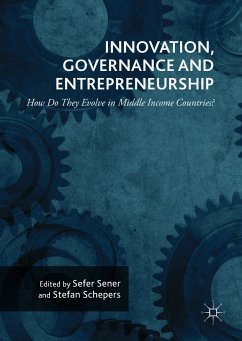This book analyses the effects of technological development, innovation, entrepreneurship and governance in middle income countries, such as Turkey, in detail. How to best practise innovation and entrepreneurship, which many researchers and policy makers believe to be the main drivers of economic growth and development, has become a fiercely-debated topic. The contributors to this volume consider economic, social and institutional dimensions of innovative thinking, entrepreneurial activity and governance, and investigate both theoretically and empirically how these factors should contribute to the uptake of new technology and the global performance of middle income countries. By offering country specific examples, and by comparing high income and middle income countries, this edited collection presents a comprehensive analysis of innovation, entrepreneurial growth and development outside the vacuum of high income economies, which has traditionally received substantially more scholarly attention.
Dieser Download kann aus rechtlichen Gründen nur mit Rechnungsadresse in A, B, BG, CY, CZ, D, DK, EW, E, FIN, F, GR, HR, H, IRL, I, LT, L, LR, M, NL, PL, P, R, S, SLO, SK ausgeliefert werden.









